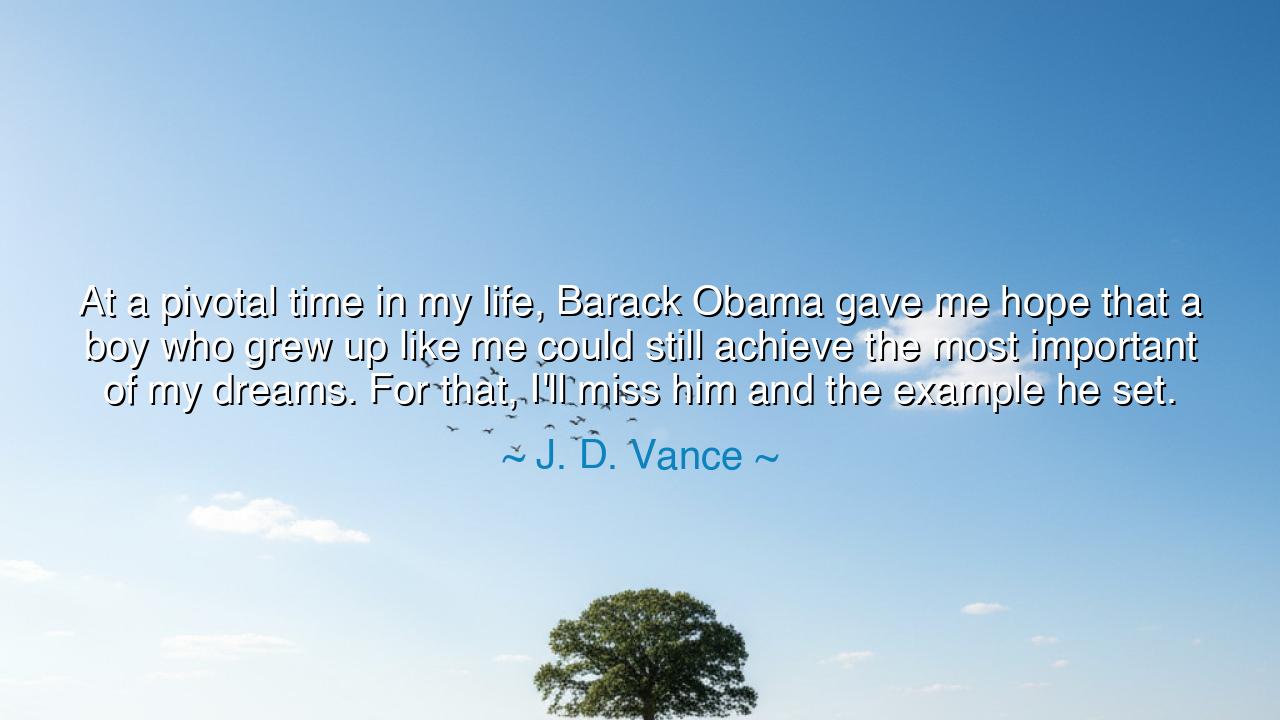
At a pivotal time in my life, Barack Obama gave me hope that a
At a pivotal time in my life, Barack Obama gave me hope that a boy who grew up like me could still achieve the most important of my dreams. For that, I'll miss him and the example he set.






“At a pivotal time in my life, Barack Obama gave me hope that a boy who grew up like me could still achieve the most important of my dreams. For that, I'll miss him and the example he set.” Thus spoke J. D. Vance, the author and thinker whose words reflect both humility and revelation. In this confession lies not mere admiration for a leader, but the recognition of a truth that transcends politics — that the sight of greatness, born from struggle, can awaken hope in those who once believed themselves forgotten. It is the eternal mystery of human inspiration: that one life, rightly lived, can illuminate countless others.
The origin of this quote lies in the years when J. D. Vance, author of Hillbilly Elegy, sought meaning amid the hardship of his upbringing in the rusted heartlands of America. He came from a world often defined by despair — communities worn down by poverty, addiction, and loss of faith in upward mobility. For many like him, the dream of a better life seemed like a fable long faded from truth. Yet when he looked upon Barack Obama, a man of humble origins who rose through integrity, intellect, and perseverance to the highest office in the land, he saw not a distant idol, but a mirror of possibility. In that reflection, Vance glimpsed the rebirth of his own belief — that even the boy who begins with little may ascend through effort, wisdom, and hope.
To understand this quote is to understand the power of example. Words alone do not move the heart; it is lives that embody them which change the world. Obama’s life — the son of a single mother, raised by grandparents, shaped by struggle yet defined by grace — stood as living proof that the barriers of circumstance are not walls, but challenges to climb. In Vance’s time of uncertainty, this example became a light. It whispered to him the ancient promise that has carried humanity through its darkest nights: you are not bound by where you begin. Thus, what he expresses here is not simple admiration for a man, but gratitude for a symbol — the living manifestation of hope through perseverance.
Such inspiration is a force older than any age. In every era, there are figures who rise from humble origins to remind the weary that destiny is not born of privilege but of character. The ancients told of Cincinnatus, the farmer called from his plow to lead Rome, who ruled with virtue and returned to his fields when the duty was done. In the same way, Obama’s example spoke to a generation that had begun to forget the nobility of hard work, humility, and moral courage. He showed that greatness need not be inherited — it can be earned, even amid the noise and divisions of a restless world. Vance’s words remind us that when one person dares to live well, they renew the faith of millions who thought the age of heroes had passed.
But Vance’s reflection also carries the melancholy of farewell. “For that, I’ll miss him,” he writes — a sentiment not of politics, but of spirit. He mourns not merely a leader’s departure, but the fading of an example that once held his hopes steady. For when a symbol of goodness departs, the world feels dimmer. Yet even in loss, there is a lesson: that the torch once carried by another must now be taken up by us. The example we revere must not die in memory — it must live on in imitation. To miss a great leader is natural; to continue their work is divine.
Indeed, this is the ancient rhythm of renewal: that the teacher departs so that the student may act. Just as the disciples carried the message of their masters into the generations that followed, so too must those inspired by goodness take up the labor of hope. Vance’s words remind us that admiration alone is not enough — it is a call to action, a challenge to embody the very values we once looked to others to uphold. The true way to honor those who inspired us is to become like them — to live in such a way that someone else may one day say, “Their life gave me hope.”
So, my child, hear this and keep it close: hope is not a gift we wait to receive; it is a light we learn to kindle. When you find someone who awakens that light in you, let it not fade when they are gone. Carry it forward. Let their example become your own strength. And when your time comes, live so that your courage may awaken another soul as theirs once awakened yours. For this is the sacred chain of humanity — each generation passing on the fire of belief, each heart reminding the next that the dream is still alive.
Thus, the wisdom of J. D. Vance’s words endures: that hope is both inheritance and duty. He saw in Barack Obama not perfection, but proof — proof that circumstance need not dictate destiny. And in seeing it, he was changed. So too must we be changed, and in turn become the example for those who follow. For when one life lived with integrity can ignite a thousand others, the world, though weary, shall never lose its light.






AAdministratorAdministrator
Welcome, honored guests. Please leave a comment, we will respond soon